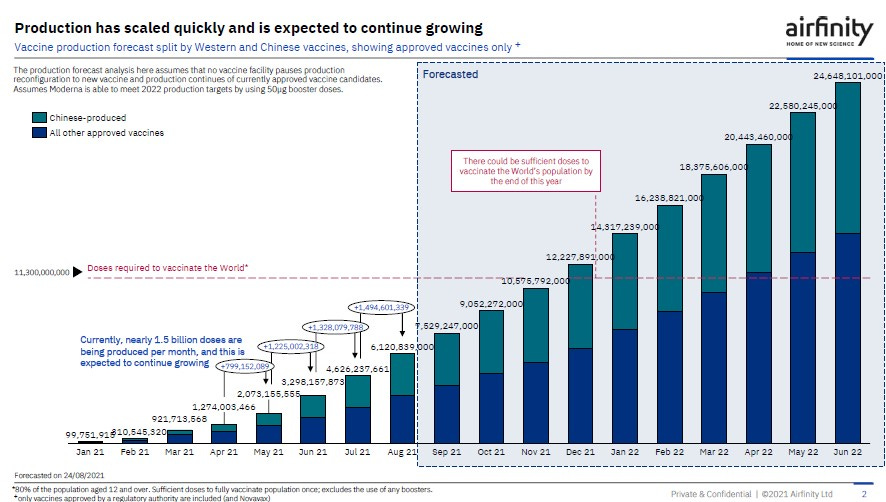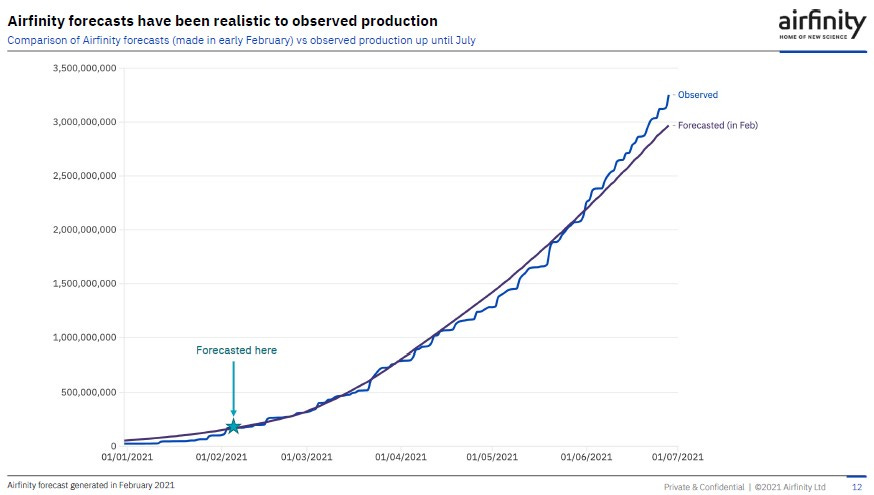Jabbed? You are one of the lucky ones
We knew the world was doing a bad job sharing vaccines. Now we know just how bad.
It isn't news that the global distribution of vaccines is hugely unfair. But many hoped that as the year progressed a vast new supply would see jabs flow more quickly to where they are so badly needed. Yet the hard truth is that rich countries have an obscene excess of vaccine. So much so that G7 countries could distribute hundreds of millions of doses today, and it would have no impact on their plans to vaccinate their own population. (And that includes boosting everyone over the age of 12.)
This year, the redistribution of surplus vaccine from G7 countries would save between 1m and 2.8m lives this year.
These numbers come from Airfinity, a life-sciences data firm that has been a reliable forecaster of vaccine supply this year1. This year G7 countries, not including Japan, could redistribute 1.2 billion doses in 2021.
You can read more of the details in a story I wrote for The Economist2 earlier today. It also explains the coming global vaccine glut. It also explains the coming global vaccine glut. And there are two points to consider. Firstly, these Airfinity calculations are conservative. Secondly, there are further surplus doses in other countries, such as China, which are not included in these calculations.
The capacity to share more vaccine, therefore, is huge. It is also worth noting that the pledges to donate are vastly larger than what has actually been delivered. Vaccine is not moving quickly enough from the warehouses and order sheets of rich countries. And lives are at stake.
Some rich countries are aware they have an oversupply. We know this because they are starting to do something called a vaccine swap3. This is where countries with contracts set to deliver soon swap them with a country whose deliveries are coming later. Poland, Britain, and Singapore have recently swapped contracts with Australia—which wants to vaccinate faster than its current contracts allow. But shouldn’t rich countries be swapping their contracts with poorer ones, or with Covax? Covax has signed contracts for billions of dollars worth of vaccine that has still not arrived. I estimate that as of September, pharma firms have delivered barely more than 100m doses4 to Covax.
Bruce Aylward, a senior advisor to the director-general at the WHO, says that there is growing discussion about secondary markets for vaccines. And that countries are saying they cannot afford to donate jabs and want to sell them. Fine. But sell it to countries that are getting slammed by Delta. There is no moral case for selling it to the highest bidder, or for political favour. Currently, in low-income countries, less than 2% of adults are fully vaccinated, compared with 50% in high-income ones5. As rich and high-middle income countries vaccinate, the burden of death in covid is shifting to poorer countries. And let us not forget that the virus needs to be suppressed *everywhere* to reduce viral evolution.
In some overmatter for my piece, Gordon Brown (yes, that one) told me yesterday that he thinks with a push, policy can change. He asked Airfinity to publish all this information so the world can see for itself the scale of the issue. Vaccine forecasts generally circulate privately and are used widely by governments. There is no time to waste. Mr Brown wants to call for an emergency G7 leaders summit this month, “to undo the damage done by the incomplete and inadequate decisions of their June meeting”. He wants hoarded stocks to be sent to Covax, and delivery contracts to be transferred so that Africa, and low-income countries, with only 2% vaccination can meet their targets. He has just published a piece in the Sunday Mirror6.
The former PM is not the only global leader with his eyes on this problem. Biden is interested, too. Which is great. I understand from a number of people that the White House has been discussing a holding meeting about this for some time (it has been busy with some other matter recently). I’m told this is likely to be on September 20th, and will discuss covid vaccines and wants to look at how to fill the supply gap to low-income and lower-middle-income countries.
Let us all try and encourage them to get this done? Do consider sharing this newsletter with anyone who might be interested in pushing for a change in policy.
There is still time to make this good and meet the target to vaccinate 40% of all countries. That will ensure those most at risk are protected.
Red tape
Two sources tell me that regulatory delays are now causing problems with the supply of new vaccines. This is having an impact on vaccines that are eagerly awaited by Covax and poorer nations. Regulatory delays are one reason why Covax’s contracted deliveries have not materialised. Another bigger one is that India has not exported a dose since April. (Yet another may be that pharma firms are in no hurry to deliver to Covax, but I can’t prove that.)
Regulatory constipation is likely to be particularly relevant to Novavax which, I’m told, has a complicated supply chain. Regulators have "limited bandwidth" explains one source. That is something of a shift, though, isn’t it? They were all working double time earlier in the year.
The problem is that there are only a small number of stringent regulatory authorities that conduct the highly technical, but necessary, business of reviewing the safety of vaccines. The global gold standard regulators include the FDA, and then the EMA and MHRA, and perhaps a few others. (The first three are based in America, Europe, and the UK.)
Readers may recall the extraordinary efforts these agencies made to working long hours to get the first vaccines onto the market. But these nations now have a plentiful supply of vaccine, so there is no hurry to get further new jabs approved. The knock-on problem this causes will be to delay the regulatory work of the World Health Organisation (WHO). WHO relies heavily on the legwork done by these agencies to generate the vaccine approvals that most of the world relies on.
Regulatory authorities are never the most thrilling of subjects. But I’m sure many will recall how important their work was to us six months ago. Regulators need to redouble their efforts on getting vaccine paperwork through for further vaccines. Going slow will cost lives just as surely as hoarding vaccines.
Only 40.2% of the world has received at least one dose7. Every new dose will save lives.
Further listening & reading
As a rich-world covid-vaccine glut looms, poor countries miss out, The Economist, September 4th, 2021.
And please do take a look at our excess death model, which has just been updated and estimates that the true death toll could be 15.2m. The pandemic’s true death toll, September 5th.
Acknowledgements
Thanks to Diana Polekhina on Unsplash for the image of the syringe.
An analysis by data firm Airfinity says there are 500 million vaccine doses available to redistribute this month (360m of which have not been earmarked for donations) and potentially 1.2 billion by the end of the year (1.06B of which have not been earmarked for donations). For more, visit: https://www.airfinity.com/insights/more-than-a-billion-available-stock-of-western-covid-19-vaccines-by-the-end
As a rich-world covid-vaccine glut looms, poor countries miss out https://www.economist.com/international/2021/09/04/as-a-rich-world-covid-vaccine-glut-looms-poor-countries-miss-out
e.g. https://www.ft.com/content/ce41fca1-3e0a-4c75-b64d-0eec0da4c04a
Covax has delivered 230m doses of which I am told just over 100m are donations as of early September.
https://www.who.int/news/item/27-08-2021-joint-statement-of-the-multilateral-leaders-taskforce-on-scaling-covid-19-tools
Denying vaccines to poor countries is stain on world’s conscience, by Gordon Brown. https://www.mirror.co.uk/news/politics/gordon-brown-denying-vaccines-poor-24910618. The figures in our two articles differ slightly. It seems Brown has excluded earmarked doses. There are 360m of the 500m doses I cite that could be redistributed that are unearmarked for donation (i.e. available for new commitments). Although frankly, the issue is getting all these doses moving, earmarked or not.
Our wold in data, September 4th, 2021. https://ourworldindata.org/covid-vaccinations







Excellent and important. Here is an update on monthly vaccine production, from the Global Commission on Post-Pandemic Policy in collaboration with Airfinity: https://globalcommissionforpostpandemicpolicy.org/covid-19-vaccine-production-to-august-31st-2021/ (If the distribution you describe doesn't happen, we'll never reach "post-pandemic")